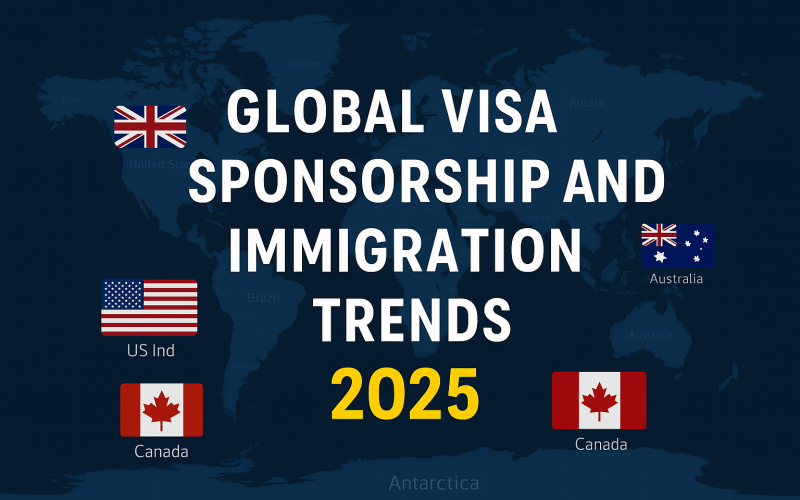Visa-Sponsored Jobs & Immigration Shifts in 2025: Global Market Breakdown for Job Hunters

The global immigration and visa sponsorship landscape in 2025 presents both challenges and opportunities for job seekers.
In 2025, the global landscape for visa sponsorship and immigration is undergoing significant transformations. From the UK's stringent immigration reforms to emerging opportunities in high-growth sectors worldwide, job seekers aiming for international careers must stay informed and adaptable. This comprehensive guide delves into the latest developments, offering insights and resources to navigate the evolving terrain of global employment.
1. United Kingdom: Navigating Stricter Immigration Policies
The UK has implemented a series of reforms aimed at reducing net migration by approximately 100,000 annually.
Key changes include:
Extended Settlement Period: Residency requirement for settlement increased from five to ten years.
English Proficiency: Stricter language requirements across all visa categories.
Skilled Worker Visa Adjustments: Eligibility now limited to graduate-level occupations; the Immigration Salary List has been eliminated.
Social Care Worker Visas: Recruitment from abroad paused, impacting the healthcare sector.
Graduate Visa Duration: Reduced from two years to 18 months.
Digital ID Implementation: Mandatory for overseas citizens, with technical issues affecting up to 700,000 migrants.
These measures have led to a significant drop in visa applications, with reports indicating a decline of over one-third as the new rules take effect.
2. United States: Evolving Visa Dynamics
The U.S. continues to be a focal point for international professionals, with notable developments in visa policies:
H-1B Visa Demand: Despite a decrease from the previous year's 758,000 registrations, USCIS received over 343,000 eligible H-1B registrations for FY 2026, surpassing the annual cap of 85,000 visas.
Domestic H-1B Renewals: Advocacy for reinstating domestic renewals aims to reduce disruptions for skilled workers.
EB-5 Investor Program: An increasing number of Indian families are utilizing this program to secure long-term residency amid tightening visa options.
3. Germany: Attracting Global Talent
Germany has overhauled its immigration system to attract skilled professionals:
Points-Based System: Evaluates qualifications, language skills, and work experience.
Job Seeker Visa: Allows individuals to enter Germany to seek employment.
Blue Card Reforms: Lowered salary thresholds and simplified recognition of foreign qualifications.
4. European Union: Streamlining Visa Applications
The EU is transitioning to a single online visa application platform:
Implementation Timeline: Scheduled to be introduced by January 2026, with full adoption by 2028.
Objective: Streamline the visa application process across member states.
5. New Zealand: New Investment Visa Categories
New Zealand has introduced two new investment visa categories:
"Growth" Category: Requires a minimum investment of NZ$5 million over three years in higher-risk investments.
"Balanced" Category: Requires a minimum investment of NZ$10 million over five years in mixed or lower-risk developments.
6. Global Talent Shortage: Opportunities for Skilled Professionals
The global talent shortage is intensifying, with an estimated shortfall of 85 million workers by 2030. This "war for talent" presents opportunities for skilled professionals, particularly in sectors like technology, healthcare, and engineering. Countries are adjusting their immigration policies to attract and retain top talent, offering visa sponsorships and streamlined processes.
7. High-Demand Sectors and Salary Insights
For job seekers exploring international opportunities, understanding high-demand sectors and corresponding salary expectations is crucial
Technology: Software development, cybersecurity, and data analysis roles are in high demand.
Healthcare: Nurses, physicians, and allied health professionals are sought after globally.
Engineering: Civil, mechanical, and electrical engineers are needed in various countries.
For detailed insights into high-demand job roles and country-wise salary information, refer to the following resources:
High-Demand Job Roles Abroad: Top Careers by Country for 2025
Country-wise Salary Insights for Sponsored Roles (2025 Updated)
8. Navigating Visa Sponsorship Opportunities
Job seekers aiming for international careers should consider the following steps:
Identify Target Countries: Research immigration policies and labor market needs.
Enhance Qualifications: Pursue certifications or degrees aligned with high-demand sectors.
Leverage Specialized Platforms: Utilize resources like SponsorMyJob to find visa-sponsored job listings and guidance.
For comprehensive guidance on securing sponsorship jobs abroad, explore:
Your Guide to Sponsorship Jobs Abroad: Everything You Need to Know
Conclusion
The global immigration and visa sponsorship landscape in 2025 presents both challenges and opportunities for job seekers. By staying informed about policy changes, focusing on high-demand sectors, and leveraging specialized resources, professionals can navigate this evolving environment effectively. Proactive planning and adaptability are key to securing international career opportunities in this dynamic landscape.
Explore More Resources
UK Visa Applications Drop by Over a Third as New Rules Take Effect
How Foreign Workers Can Target High-Growth Sectors in the UK to Secure a Sponsored Visa
The Global Talent Battle: How Visa-Sponsored Jobs Are Reshaping Careers in 2025
Australia's 9 Major Visa Changes in May 2025: What You Need to Know
Global Visa-Sponsored Job Market in April-May 2025: The Game-Changing Shifts You Must Know
UK-India Free Trade Agreement 2025: Comprehensive Guide to Visa Implications and Opportunities
Global Visa Immigration Updates April-May 2025
Unlocking Opportunities: How the UK-India FTA Transforms Work Visas for Indian Professionals
Visa-Sponsored Jobs 2025: Where the World Wants You to Work and What They'll Pay
UK's 2025 Immigration Overhaul: Navigating the New Landscape for Indian Students and Professionals
Note: This blog post is for informational purposes only and does not constitute legal advice. For personalized guidance, consult with immigration professionals or relevant authorities.



